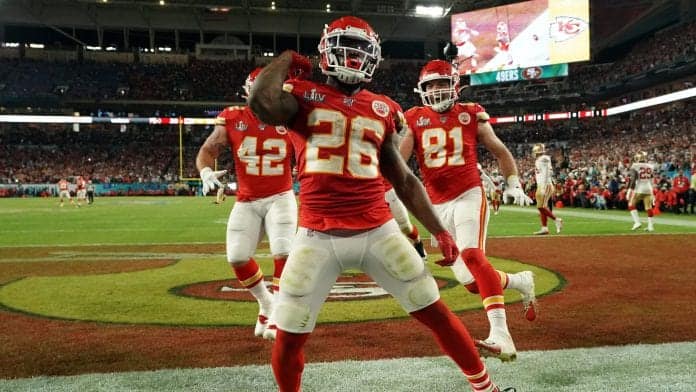On Sunday night, the Kansas City Chiefs won their first Super Bowl in 50 years, and star quarterback Patrick Mahomes was named Super Bowl MVP. Mahomes played well, throwing for 286 yards and two touchdowns, and added a rushing touchdown on top of that. However, I would argue that there was another player more deserving of winning the award: running back Damien Williams, who had a record-setting day, becoming the first player in Super Bowl history with more than 100 rushing yards, and both a receiving and rushing touchdown.
Because Mahomes was so crucial in orchestrating the Chiefs fourth-quarter comeback, it is easy to forget that he played a significant role in putting the team in that situation in the first place. He threw an interception on each of Kansas City’s first two second-half drives. Meanwhile, Williams caught the touchdown that gave the Chiefs the lead and rushed for the touchdown that ultimately put the nail in the San Francisco 49ers coffin. He had an extraordinary and impactful performance, and deserved to be rewarded for it by being named the Super Bowl 54 MVP.
Comparing Mahomes and Williams’ statistics using the OSM
Other than conventional statistics, an important metric that PFN uses to evaluate player performances is the Offensive Share Metric (OSM), which gives players a grade based on how much of their statistics could be attributed to their own level of play, rather than the play of their teammates. If Mahomes graded significantly higher than Williams on this metric, it might indicate that making him the Super Bowl 54 MVP was the correct decision, even though Williams outperformed him.
Interestingly though, neither player graded well according to our metric. Mahomes received a grade of 19.34, and Williams received a grade of 12.77. Neither of those grades is particularly high, but on the surface, the metric appears to favor the quarterback. However, some additional context is required. Running back grades are significantly lower than quarterback grades on average. By the nature of the position, running backs rely more heavily on their teammates than quarterbacks do. In order to compensate for this trend, we can rank the players’ performances alongside the grades produced by other players in their respective positions during the regular season. Mahomes’ grade would rank 32nd among qualifying quarterbacks, and Williams’ would rank 30th among running backs. Neither ranking is terrible, relatively speaking, but both are on the lower end of the spectrum.
Explaining why Mahomes and Williams’ grades in the Super Bowl were so low is simple when you look at the factors that go into calculating the OSM. For Mahomes, he only threw 9.5% of his 42 passing attempts into tight windows, and his 61.9% completion percentage was still 4.7% lower than expected, according to the NFL’s calculations. In Williams’ case, San Francisco only put eight or more defenders in the box against him 5.88% of the time, making running the ball much easier for him. For both players, their performances were aided by the situations they were in, lowering their grades.
As a caveat, the OSM does not take into account quarterback passing statistics or running back receiving statistics, which would likely have affected Mahomes and Williams’ grades. However, without the data, it is impossible to get specific details. What we can say is that Mahomes and Williams had roughly comparable impacts on their statistics, at least in their primary area of the offense.
Explaining why Williams wasn’t named the Super Bowl 54 MVP
Williams had better stats than Mahomes, and also had a comparable OSM grade, so it seems clear that he should have had at least an equal claim to be the Super Bowl 54 MVP award as Mahomes did. So why didn’t he win? The most obvious answer is that Mahomes is the better-known player. Even seemingly impartial judges will often be drawn to the bigger name. But I think the real reason has more to do with the positions of the two players. In the modern NFL, where passing the ball has become the dominant method of gaining yards on offense, the quarterback is king. Each year, desperate fans hope their team will find the next Patrick Mahomes or Lamar Jackson in the draft.
Meanwhile, the bell-cow running back is falling out of favor. Many teams, including the 49ers, use a rotation of several running backs rather than a single starter. This trend in how offenses are run will inevitably affect judges’ perception of player performances. So, when choosing between two players, people will naturally gravitate towards the player of the generally more influential position, even if they had less impact on a specific game.
Williams isn’t the only victim of this phenomenon in recent years, either. In Super Bowl 51, New England Patriots running back James White had a record-setting day, with 139 yards from scrimmage, and a Super Bowl record-tying three touchdowns. When you add in the two-point conversion he scored, White gained a total of 20 points, more than any player in Super Bowl history. Despite those remarkable achievements, the MVP award went instead to quarterback Tom Brady. The last running back to actually receive the honor was Terrell Davis in Super Bowl 32, more than two decades ago. The position simply isn’t valued very highly in the modern NFL, and their performances often get overlooked.
Mahomes might be the more valuable player than Williams overall, but not on Sunday night
Once again, the goal of this article is not to discredit what Mahomes accomplished on Sunday. In just his third NFL season, he led one of the largest comebacks in Super Bowl history. He is unarguably a better player than Williams overall and was significantly more critical to the Chiefs success this season. But that doesn’t mean he was the better player on Sunday. When giving out an award based on a single game, only that game should get taken into account. And in Super Bowl 54, Williams was more deserving of being the MVP.

